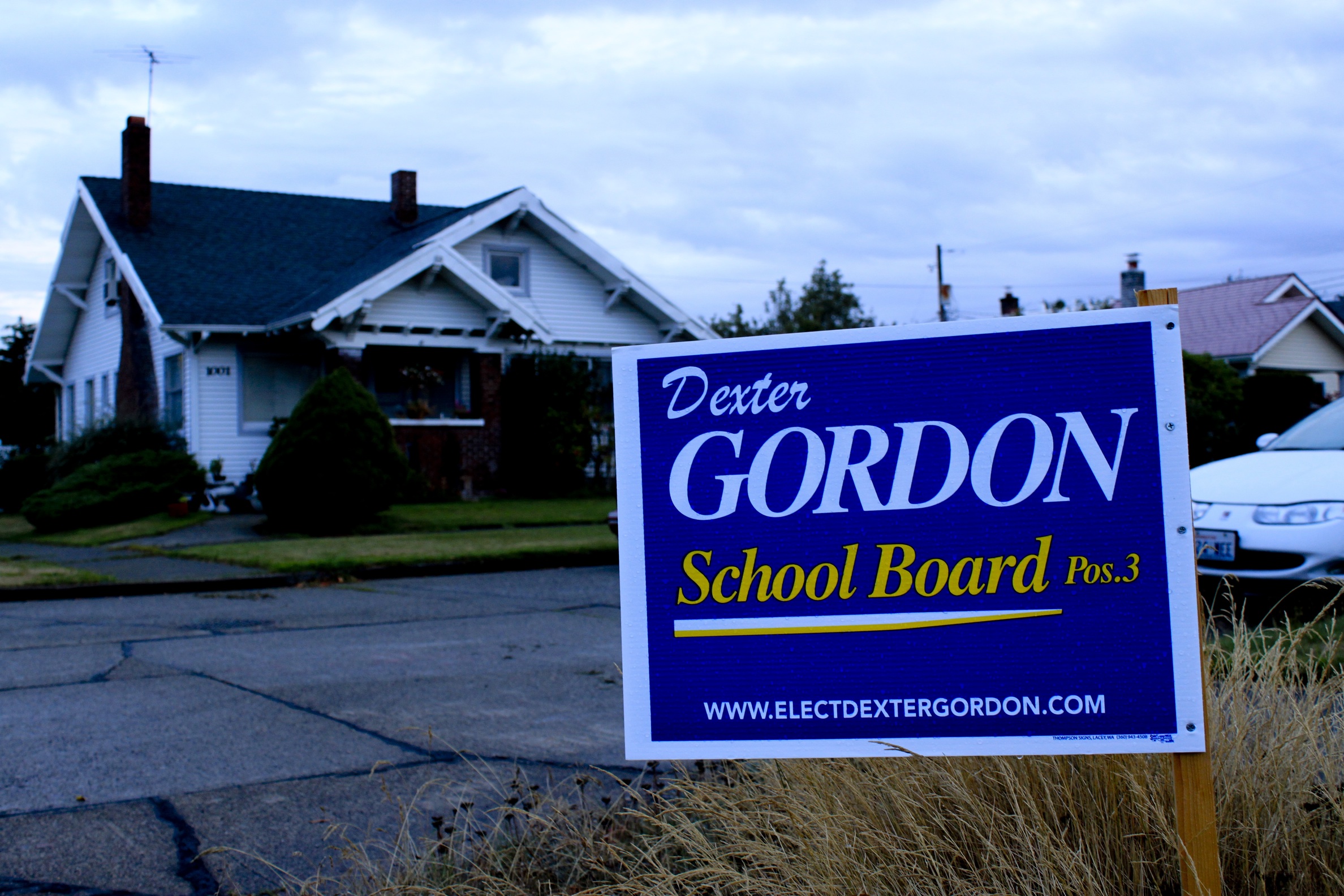
Riding along a residential street in Tacoma you may notice blue and yellow yard signs that read: “Dexter Gordon, School Board Pos. 3.” They are unremarkable in their message and design, but the man behind them is a surprising candidate for the Tacoma school board.
Professor Dexter Gordon’s office is located at the top of Jones Hall in the African American Studies Department. Books cover two walls, and the remaining space is filled with artwork—photos of civil rights activists, a printout that reads “Another Educated Black Man,” photos of his family and posters from the annual Race and Pedagogy Initiative.
Professor Gordon is both a professor of Communications and the Director of the African American Studies Department. He teaches everything from introductory courses to upper-level Rhetorical Theory and Narratives in Race. His students are passionate about his teaching; he is alternately described as “badass” and “brilliant.” With a well established career in higher education, running for school board seems like an odd career move.
Education has interested Gordon for years. In a speech announcing his candidacy, he said public schools are the reason he has gone from being the son of a Jamaican fisherman to becoming a distinguished professor. Four years after coming to Puget Sound, he began the Race and Pedagogy Initiative to connect local public school administrators and teachers with the pedagogical research being generated in higher education. He believes that there should not be such a stark separation between the K12 system and universities. In June of 2011, Gordon announced his candidacy for School Board, but he has been involved with local schools for some time.
“I’m in this community, I’m an educator, I’ve lived here for 10 years, I’ve worked at all levels of education from the legislature to students at the kindergarten level in the classroom,” Gordon said. “I’ve organized communities, teachers and administrators. I could not live with myself in a community like this if it continues to choose subpar leadership. My argument is if my family is going to live here, I have a commitment to making sure our education is the best it can be.”
Gordon has mounted a campaign that not only seeks to get him elected but also to embody his principles. By holding home-based events in churches and community centers, Gordon is creating a dialogue about education in Tacoma. In the process he hopes to connect with voters who traditionally are not interested in bottom-of-the-ballot elections such as the School Board. He believes that community engagement is paramount in fixing the existing problems in Tacoma.
Tacoma Public Schools face severe challenges. Washington State’s third largest district serves 28,000 students and consists of 35 elementary schools, nine middle schools, five high schools and 14 alternative learning sites. Sixty-one percent of students qualify for Title I, which includes assistance such as free and reduced-cost lunch. The district has failed to meet the Adequate Yearly Progress Goals set by Washington State every year since the 2002-03 school year when data was first recorded.
The results show there is a clear achievement gap for racial minorities and low-income students. During the 2010-11 school year the only high school-aged group to reach proficiency in either reading or math was white students. Low-income students did not meet proficiency in any age group on any test. The only age group to entirely reach proficiency this past year was the average elementary school student on the math test.
There is also a growing rift between the teachers and the district that culminated in a 10-day strike that kept students from beginning school on time. The strike ended after Governor Christine Gregoire brokered a deal that avoided teacher pay cuts and kept class sizes the same by dipping into Tacoma’s reserves.
As a School Board member, Gordon hopes to tackle these challenges with a strategy that looks at issues inside the schools and in the community. In schools, he believes there must be a commitment to hiring quality teachers. However, when it comes to the national conversation about fixing the education system, he sees the blame too readily placed on the teachers. He characterizes the Tacoma schools as pockets of excellence, citing successes such as the School of the Arts (SOTA) and Science and Math Institute (SAMI), but stresses that there must be equal education for all students.
“We have 37 middle schools and five high schools, but we only point to a handful of top-performing schools. My argument is that is not good enough. All 28,000 students deserve quality education,” he said. “Any notion that we can bus students from one section to another doesn’t make any sense to me, because that says you have given up on some sector of the school district.”
According to Gordon, working with the community is key to strengthening Tacoma Schools. He laments that some schools do not even have a PTA and would like the School Board to provide top-down leadership to ensure there is one in every school. He also wants to see more programs that deal with the problem of homeless children and points to initiatives that provide housing vouchers to give homeless children stability.
“It is very tough times, but economic questions are always questions of priority. Education gets a big share of the state budget but that is as it should be because that has to be a priority,” Gordon said.
So far, things look good for Gordon’s campaign. He made it through the primaries and is getting ready for the general election on Nov. 8. In the meantime, Gordon is continuing to knock on doors, hold community meetings, put up yard signs and, of course, teach.
